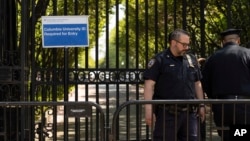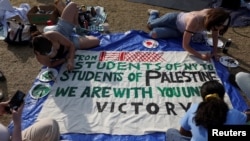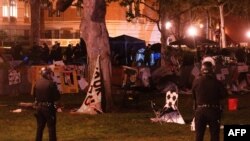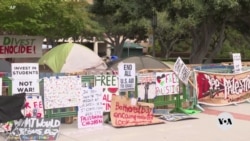Student Union
North Korea Says Released Australian Student Was Spying

North Korea said Saturday that an Australian student who it detained for a week had spread anti-Pyongyang propaganda and engaged in spying by providing photos and other materials to news outlets with critical views toward the North.
Pyongyang’s official Korean Central News Agency, or KCNA, said North Korea deported Alek Sigley on Thursday after he pleaded for forgiveness for his activities, which the agency said infringed on the country’s sovereignty.
North Korea has been accused in the past of detaining Westerners and using them as political pawns to gain concessions. KCNA provided few details about Sigley’s alleged spying activities other than that he, at the “instigation” of the media outlets, provided them with photos and data that he had collected.
North Korea, which closely monitors visitors and enforces a stringent information blockade on its citizens, is extremely sensitive about controlling the flow of information, which made Sigley, who had a lively presence on Twitter, an anomaly in the country.
Sigley arrived in Tokyo on Thursday after telling reporters he was in “very good” condition, but without saying what happened to him. His father, Gary Sigley, a professor of Asian studies at the University of Western Australia, said his son was treated well in North Korea.
Sigley had been studying at a Pyongyang university and guiding tours in the North Korean capital before disappearing from social media contact with family and friends.
KCNA said Sigley, who was caught “red-handed” by a “relevant institution” of the North on June 25, had abused his status as a student by “combing” through Pyongyang and providing photos and other information to news sites such as NK News and other “anti-DPRK” media, a reference to the North’s formal name, the Democratic People’s Republic of Korea. The news agency said the North expelled Sigley out of “humanitarian leniency.”
“He honestly admitted his spying acts of systematically collecting and offering data about the domestic situation of the DPRK and repeatedly asked for pardon, apologizing for encroachment upon the sovereignty of the DPRK,” the agency said.
The North had not commented on Sigley before Saturday.
Sigley was released following intervention by Swedish diplomats. After his arrival in Beijing, he went to Tokyo to reunite with his Japanese wife, who he married in Pyongyang last year.
During his time in North Korea, Sigley often shared details about his life in Pyongyang through social media and the website of his travel agency, Tongil Tours, frequently challenging negative outside perceptions about the North and at times boasting about the extraordinary freedom he had as one of the few foreign students living there.
He also wrote op-eds and essays that appeared in the Western media, including NK News, although none of them seemed outwardly critical about the North’s government and political system.
In a statement published on its site, NK News CEO Chad O’Carroll said it would be a “misrepresentation” for the North to describe the articles Sigley wrote for the outlet as anti-state. He said NK News is an independent, specialist information website that aims to provide objective news and analysis about North Korea.
“Alek Sigley’s well-read columns presented an apolitical and insightful view of life in Pyongyang which we published in a bid to show vignettes of ordinary daily life in the capital to our readers,” O’Carroll said.
“The six articles Alek published represent the full extent of his work with us and the idea that those columns, published transparently under his name between January and April 2019, are ‘anti-state’ in nature is a misrepresentation which we reject,” he said.
Sigley’s ordeal had a much happier ending than that of American college student Otto Warmbier, who was convicted of attempting to steal a propaganda poster and imprisoned in North Korea. Warmbier died shortly after being sent back home to the U.S. in a vegetative state in June 2017.
See all News Updates of the Day
Pro-Palestinian protesters break through barricades to retake MIT encampment

Pro-Palestinian protesters who had been blocked by police from accessing an encampment at the Massachusetts Institute of Technology on Monday broke through fencing, linked arms and encircled tents that remained there, as Columbia University canceled its university-wide commencement ceremony following weeks of pro-Palestinian protests.
Sam Ihns, a graduate student at MIT studying mechanical engineering and a member of MIT Jews for a Ceasefire, said the group has been at the encampment for the past two weeks and that they were calling for an end to the killing of thousands of people in Gaza.
"Specifically, our encampment is protesting MIT's direct research ties to the Israeli Ministry of Defense," he said.
Protesters also sat in the middle of Massachusetts Avenue, blocking the street during rush hour in the Boston area.
The demonstrations at Columbia have roiled its campus and officials said Monday that while it won't hold it's main ceremony, students will be able to celebrate at a series of smaller, school-based ceremonies this week and next.
The decision comes as universities around the country wrangle with how to handle commencements for students whose high school graduations were derailed by COVID-19 in 2020. Another campus shaken by protests, Emory University, announced Monday that it would move its commencement from its Atlanta campus to a suburban arena. Others, including the University of Michigan, Indiana University and Northeastern, have pulled off ceremonies with few disruptions.
Columbia's decision to cancel its main ceremonies scheduled for May 15 saves its president, Minouche Shafik, from having to deliver a commencement address in the same part of campus where police dismantled a protest encampment last week. The Ivy League school in upper Manhattan said it made the decision after discussions with students.
"Our students emphasized that these smaller-scale, school-based celebrations are most meaningful to them and their families," officials said.
Most of the ceremonies that had been scheduled for the south lawn of the main campus, where encampments were taken down last week, will take place about 8 kilometers (5 miles) north at Columbia's sports complex, officials said.
Speakers at some of Columbia's still-scheduled graduation ceremonies include Pulitzer Prize-winning playwright James Ijames and Dr. Monica Bertagnolli, director of the National Institutes of Health.
Columbia had already canceled in-person classes. More than 200 pro-Palestinian demonstrators who had camped out on Columbia's green or occupied an academic building were arrested in recent weeks.
Similar encampments sprouted up elsewhere as universities struggled with where to draw the line between allowing free expression while maintaining safe and inclusive campuses.
The University of Southern California earlier canceled its main graduation ceremony. Students abandoned their camp at USC on Sunday after being surrounded by police and threatened with arrest.
Other universities have held graduation ceremonies with beefed-up security. The University of Michigan's ceremony was interrupted by chanting a few times Saturday. In Boston on Sunday, some students waved small Palestinian or Israeli flags at Northeastern University's commencement in Fenway Park.
Emory's ceremonies scheduled for May 13 will be held at the GasSouth Arena and Convocation Center in Duluth, almost 20 miles (30 kilometers) northeast of the university's Atlanta campus, President Gregory Fenves said in an open letter.
"Please know that this decision was not taken lightly," Fenves wrote. "It was made in close consultation with the Emory Police Department, security advisors and other agencies — each of which advised against holding commencement events on our campuses."
The 16,000-student university is one of many that has seen repeated protests stemming from the conflict that started Oct. 7 when Hamas militants attacked southern Israel, killing about 1,200 people, mostly civilians, and taking roughly 250 hostages. Student protesters are calling on their schools to divest from companies that do business with Israel or otherwise contribute to the war effort.
Vowing to destroy Hamas, Israel launched an offensive in Gaza that has killed more than 34,500 Palestinians, about two-thirds of them women and children, according to the Health Ministry in the Hamas-ruled territory. Israeli strikes have devastated the enclave and displaced most of its inhabitants.
Hamas on Monday announced its acceptance of an Egyptian-Qatari cease-fire proposal, but Israel said the deal did not meet its "core demands" and that it was pushing ahead with an assault on the southern Gaza town of Rafah.
"Cease-fires are temporary," said Selina Al-Shihabi, a Georgetown University sophomore who was taking part in a protest at George Washington. "There can be a cease-fire, but the U.S. government will continue to arm the Israeli military. We plan to be here until the university divests or until they drag us out of here."
At the University of California, San Diego, police cleared an encampment and arrested more than 64 people, including 40 students.
The University of California, Los Angeles, moved all classes online for the entire week due to ongoing disruptions following the dismantling of an encampment last week. The university police force reported 44 arrests but there were no specific details, UCLA spokesperson Eddie North-Hager said in an email to The Associated Press.
Schools are trying various tactics from appeasement to threats of disciplinary action to get protestors to take down encampments or move to campus areas where demonstrations would be less intrusive.
The School of the Art Institute of Chicago said in a Facebook post Sunday that it offered protesters "amnesty from academic sanction and trespassing charges" if they moved.
"Many protesters left the premises of their own accord after being notified by the police that they were trespassing and subject to arrest," the school said. "Those that remained were arrested after multiple warnings to leave, including some of whom we recognized as SAIC students."
A group of faculty and staff members at University of North Carolina at Chapel Hill asked the administration for amnesty for any students who were arrested and suspended during recent protests. UNC Faculty and Staff for Justice in Palestine said in a media advisory that it would deliver a letter on behalf of more than 500 faculty who support the student activists.
Other universities took a different approach.
Harvard University's interim president, Alan Garber, warned students that those participating in a pro-Palestinian encampment in Harvard Yard could face "involuntary leave." That means they would not be allowed on campus, could lose their student housing and may not be able to take exams, Garber said.
Columbia University cancels main commencement after protests that roiled campus for weeks

Columbia University is canceling its large university-wide commencement ceremony amid ongoing pro-Palestinian protests but will hold smaller school-based ceremonies this week and next, the university announced Monday.
"Based on feedback from our students, we have decided to focus attention on our Class Days and school-level graduation ceremonies, where students are honored individually alongside their peers, and to forego the university-wide ceremony that is scheduled for May 15," Columbia officials said in a statement.
The protests stem from the conflict that started Oct. 7 when Hamas militants attacked southern Israel, killing about 1,200 people, mostly civilians, and taking roughly 250 hostages. Vowing to destroy Hamas, Israel launched an offensive in Gaza that has killed more than 34,500 Palestinians, about two-thirds of them women and children, according to the Health Ministry in the Hamas-ruled territory. Israeli strikes have devastated the enclave and displaced most of its inhabitants.
The University of Southern California earlier canceled its main graduation ceremony while allowing other commencement activities to continue.
- By VOA News
Where Are Pro-Palestinian Campus Protests Happening?

Colleges in the U.S. have been rocked by a wave of campus protests calling for an end to the war in Gaza, and for U.S. colleges to divest from Israel.
The Wall Street Journal’s Steven Russolillo rounds up some of the most important ones. (April 2024)
Pro-Palestinian protests in US could impact 2024 election
Despite the fact that many of their encampments at university campuses have been dismantled, pro-Palestinian demonstrators in the United States are standing their ground. If the protests continue, some analysts say they could have an impact on the 2024 presidential election. VOA’s Veronica Balderas Iglesias explains.
- By VOA News
Pro-Palestinian protest ends quietly at University of Southern California

Pro-Palestinian protesters at an encampment at the University of Southern California, one of the focal points of anti-Israel protests across U.S. college campuses, left the scene early Sunday after authorities warned them that they could be arrested.
Their departure came after university safety officers and Los Angeles police began clearing the center of campus, where police had arrested 93 people on April 24.
"If you are in the center of campus, please leave,” the university warned the protesters on the social media platform X, saying they could be arrested if they stayed.
Elsewhere, pro-Palestinian protests continued at several college graduation ceremonies on Saturday.
At the University of Virginia, 25 people were arrested for trespassing after police clashed with pro-Palestinian protesters who refused to remove tents from the campus.
At the University of Michigan, demonstrators chanted anti-war messages and waved flags during graduation ceremonies. More protests occurred at Indiana University, Ohio State University, Princeton University in New Jersey and Northeastern University in Massachusetts.









